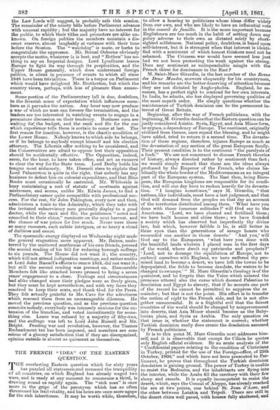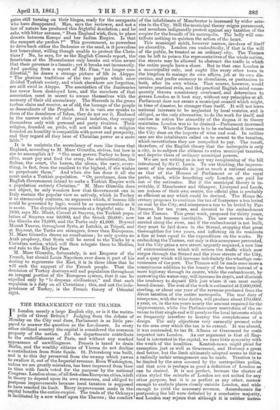the Law Lords Will suggest, is probably safe this session.ito
allow a hearing to politicians whose ideas differ widely The remainder of the ninety bills before Parliament advance from our own, and who are likely to have an influential vote with unusual rapidity ; but the majority have no interest for in the conseil de famine. It is the more important because the public, to which their titles and promoters are alike un- Englishmen are too much in the habit of setting down any known. On foreign polities the members maintain a dis- policy adverse to their own as dictated solely by short. erect reserve, almost laughably at variance with their tone sighted selfishness. National policy, doubtless, is based upon before the Session. The " watchdog" is mute, or barks to self-interest, but it is strongest when that interest is identi_ Congratulate the oppressor. Mr. Bernal Osborne obviously fled with a sentiment of which honest thinkers need not be accepts the motto, whatever is is best, and " Eothen" has no- ashamed. The Crimean war would have seemed less just thing to say on Imperial designs. Lord Lyndhurst leaves had we not been protecting the weak against the strong. Europe to fight its way through its perplexities, and the Does any sentiment as unimpeachable mingle with the Upper House generally, which does understand foreign French thirst for dominance in the East ? politics, is silent in presence of events to which all since M. Saint-Marc Girardin, in the last number of the Revue 1848 have been trivialities. There is a torpor on Parliament der Deux Mender, answers eloquently for his countrymen, Which would have delighted Mr. Brotherton, but which the and his remarks are the better deserving of attention because country views, perhaps, with less of pleasure than amaze- they are not dictated by Anglo-phobia. England, he as- ment. sumea, has a perfect right to contend for her own interests.
Some portion of the Parliamentary lull is due, doubtless, In India, he admits, she has displayed governing qualities of only English official evidence. By an acute analysis of the "Confidential papers relating to the condition of Christians THE FRENCH "IDEA" OF TR-P1 EASTERN in Turkey, printed for the use of the Foreign-office, of 25th gates still turning on their hinges, ready for the occupants who have disappeared. Man, says the reviewer, and not a law of nature has produced this frightful desolation; • and he asks, with bitter sarcasm," Does England wish, then, to place deserts between Europe and her Indian Empire. Is that the rampart she prefers ?" This government, so powerless to drive back either the Bedouins or the sand, is it powerless but benevolent, willing though unable to protect the Chris- tians? No, he says, for as the English Consuls report, the fanaticism of the Mussulmans only breaks out when aware that their governor is a fanatic ; yet it breaks out incessantly. And quoting from a report of Mr. Finn, "no longer con- fidential," he draws a strange picture of life in .Aleppo. " The glorious traditions of the two parties which once divided Turkish society, and which elsewhere are forgotten, are still vivid in Aleppo. The association of the Janissaries has never been destroyed here, and the members of that association meet in secret to amuse themselves with the memory of their old ascendancy. The Shereefs in the green turban claim and receive, as of old, the homage of the people as descendants of the Prophet. It is in vain one speaks to them of the decadence of Islam, they do not see it. Enclosed in the narrow circle of their proud isolation, they occupy themselves only with personal and party rivalries. Their religion, founded on pride, will not admit that a religion founded on humility is compatible with power and prosperity, and they regard all they hear of Christian power as a mere fable."
It is to maintain the ascendancy of men like these that England, according to M. Marc Girardin, strives, but how is she to accomplish it ? "She must govern Turkey to keep it alive, must pay and feed the army, the administration, the Sultan, the court, the harem, the ulema, the navy, every- thing, in fact, from the smallest to the highest, if she wishes to perpetuate them." And when she has done it all she must make a Turkish population. "Or, perchance, does the English Government intend to make a Turkish Empire with a population entirely Christian." M. Marc Guardia does not object, he only wonders how that Government can in Italy sustain the popular view so actively, which in Turkey it so strenuously contests, an argument which, if human life could be governed by logic, would be as unanswerable as it is acute. The depopulation proceeds at a frightful rate. In 1830, says Mr. Blunt, Consul at Smyrna, the Turkish popu- lation of Smyrna was 80,000, and the Greek 20,000; now the Greeks are 75,000, and the Turks only 41,000. Beyond Mount Taurus, throughout Syria, at Latakia, at Tripoli, and at Beyrout, the Turks are strangers, fewer than Europeans. M. Marc Girardin draws no conclusions ; he only quotes an Arab prophecy, that Syria will be saved to the Turks by a Christian nation, which will then relegate them to Medina, and rule to the Khyber Pass.
M. Marc Girardin, fortunately, is not Emperor of the French, but should Louis Napoleon ever deem it part of his destiny to regenerate the East, it is in these ideas that he will seek the support of the French people. That the dominion of Turkey destroys soil and population throughout an integral portion of the European system, that it can be expelled only by "le drapeau civilisateur," and that such expulsion is a duty on all Christians ; this, and not the inde- pendence of Turkey, is the French theory of Oriental right.































 Previous page
Previous page